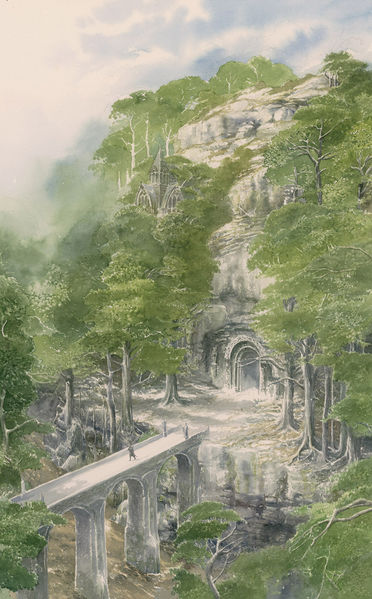The Long Road to Menegroth: Part Three of “The Wanderings of Hurin”
Wednesday, June 17, 2009
posted by Deuce Richardson
 Print This Post
Print This Post
“But upon all whom you love my thought shall weigh as a cloud of Doom, and it shall bring them down into darkness and despair. Wherever they go, evil shall arise. Whenever they speak, their words shall bring ill-counsel. Whatsoever they do shall turn against them. They shall die without hope, cursing both life and death.”
Morgoth’s words to Húrin, son of Galdor, upon the Haudh-en-Nirnaeth, from The Children of Húrin by J.R.R. Tolkien.
In my first post about Húrin, the greatest mortal warrior of Tolkien’s First Age, I looked at his life and deeds up to his sixtieth year. In my follow-up blog, I then summarized the events laid out in the collection of texts which JRRT seems to have intended to call “The Wanderings of Húrin.” In this post, I will trace Húrin’s journey to its bitter end. Much of this is recounted in The Silmarillion, but significant bits of the tale can only be found in The War of the Jewels: The Later Silmarillion.
When last we saw Húrin, he had, within the space of a few days, accomplished the ruin of Brethil and the ruling line of that land was extinguished. He had no intention of cooling his heels. With the hall of the last Chieftain of Brethil in flames behind him, Húrin set out for Nargothrond, the ruined fortress-city of the Elf-king, Finrod Felagund.
Hurin’s motives for this move are unclear. His son, Túrin, was a great defender and war-captain of Nargothrond before its fall, but that seems insufficient reason to walk the long leagues required to get there. In a note written around the same time as the other texts dealing with “The Wanderings of Húrin,” Tolkien wrote that a thirst for “news” of some sort, though of what and from whom is not stated, was one motive for Húrin’s journey to Nargothrond. Tolkien also made a passing mention of some degree of admiration and friendship between the son of Galdor and Felagund. Perhaps Húrin simply wished to see the hoard of the dragon, Glaurung. His own son had slain Glaurung, a feat that would be remembered for many centuries to come.
Húrin found a new claimant to Glaurung’s hoard when he reached Nargothrond: Mîm the Petty-Dwarf. Years before, Mîm had betrayed Túrin and his men to the agents of Morgoth. Húrin knew this. Mîm laid claim to the treasures of Nargothrond by right of the fact that the halls of Felagund’s city were first hewn out by Dwarves, long before Finrod Felagund came over the sea from Valinor. The father of Túrin had scant patience for Mîm’s lawyering.
‘Then you shall enjoy your inheritance no longer,’ said Húrin; ‘for I am Húrin son of Galdor, returned out of Angband, and my son was Túrin Turambar, whom you have not forgotten; and he it was that slew Glaurung the Dragon, who wasted these halls where now you sit; and not unknown is it to me by whom the Dragon-helm of Dor-lómin was betrayed.’
With that, Húrin drew his sword and cut Mîm down on the spot. The last of the Petty-Dwarves was dead. Wandering the once-beautiful, treasure-strewn halls which still reeked of dragon, Húrin found the one thing he sought there. Placing it beneath his cloak, he strode out, black staff in hand, and turned his face eastward towards far-off Doriath, the Guarded Realm.

Doriath was the most powerful Elven-realm in Beleriand, ruled by Thingol and his consort, Melian. At some point in the past, every member of Húrin’s family had guested in Menegroth of the Thousand Caves, the fortress of Thingol. Those stays had not ended well and Húrin burned for yet another reckoning.
Húrin was brought before King Thingol. The Lord of Menegroth greeted Húrin, who simply stood silent before the throne, making no answer. Then Hurin drew forth what he had brought out of Nargothrond. It was the Nauglamír, the greatest treasure ever crafted by the Dwarves. Set with gems brought from the Undying Lands, it was a necklace made at the order of Finrod Felagund and was prized by him above all other treasures. Húrin cast it at Thingol’s feet.
‘Receive thou thy fee,’ he cried, ‘for thy fair keeping of my children and my wife! For this is the Nauglamír, whose name is known to many among Elves and Men; and I bring it to thee out of the darkness of Nargothrond, where Finrod thy kinsman left it behind him when he set forth with Beren son of Barahir to fulfill the errand of Thingol of Doriath!’
Thingol endured Húrin’s scornful words in silence, for he knew something of what had befallen the son of Galdor and pitied him. Finally, Queen Melian spoke, showing to Húrin how Morgoth had twisted every kind action and honest mistake. The scales fell from Húrin’s eyes and he stood moveless and silent. Then he picked up the Nauglamír and handed it to Thingol.
‘Receive now, lord, the Necklace of the Dwarves, as a gift from one who has nothing, and as a memorial of Húrin of Dor-lomin. For now my fate is fulfilled, and the purpose of Morgoth achieved; but I am his thrall no longer.’
Then he turned away, and passed out from the Thousand Caves, and all that saw him fell back before his face; and none sought to withstand his going, nor did any know whither he went. But it is said that Húrin would not live thereafter, being bereft of all purpose and desire, and he cast himself at last into the western sea; and so ended the mightiest of the warriors of mortal Men.
*Art by Alan Lee
